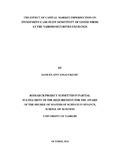| dc.description.abstract | The study sought to determine the effect of capital market imperfection on investment - cash flow sensitivity of listed firms in NSE. The factors identified in the study are proxies for capital market imperfections and investment cash flow sensitivity. The proxies for capital market imperfections included; institutional ownership, the size of the firm and the liquidity of the firm. Whereas the proxy for cash flow sensitivity was taken to be the change in capital expenditure of the listed firms at the NSE. Because of the big values involved, the natural logs (ln) of the variables were used. This research was conducted through a descriptive survey design. The descriptive survey design was considered appropriate as it enables description of the characteristics of certain groups, estimation of the proportion of people who have certain characteristics and making of predictions. This study collected quantitative data in the form of secondary data. The secondary data sources were obtained from the published annual reports of the listed firms over a period of 5 years (2009-2013). Quantitative data was analyzed by descriptive statistics. The multiple linear regression analysis and t-statistic test was used to determine the relative importance (sensitivity) of each independent variable (institutional ownership, the size of the firm and the liquidity of the firm) in affecting the investment-cash flow sensitivity of listed firms in NSE. From the findings, the study found that the size and liquidity of the firms had a positive significant influence on the investment- cash flow sensitivity of the listed firms while institutional ownership did not significantly influence the listed firms‟ investment- cash flow sensitivity. The study concludes that capital market imperfections had a significant influence on the listed firms‟ investment- cash flow sensitivity. The study recommends that the managers of the listed firms should focus more in investing in high return assets, adopt a balanced dividend policy and seek an optimal equity-debt financing in order to positively influence their firms‟ investment- cash flow sensitivity. | en_US |

